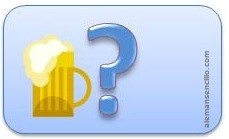Closed questions (Ja/Nein) and open ones. Interrogative particles, interrogative pronouns, interrogative adverbs.

To show interrogation in German, the order of the subject and verb is simply inverted:
Hast du Zeit?➜Ja, ich habe Zeit
Do you have time? Yes, I have time
In German, there are 2 types of questions:
Bist du müde?
Are you tired?
Wann kommst du?
When are you coming?
The "Ja-Nein" questions are those which do not have any interrogative particle and whose expected answer is "Yes" or "No" ("Ja", "Nein" or "Doch")
Sind Sie verheiratet?
Are you married?
When constructing the question, the verb moves to the beginning of the sentence (position number 1). Main article: the sentence
Open questions or "W-Fragen" have an interrogative particle at the beginning of the sentence:
Wo sind Sie geboren?
Where were you born?
The verb moves to the beginning of the sentece given that the interrogative particle does not take a position (Main article: the sentence)
| Interrogative pronouns | Interrogative adverbs | ||
|---|---|---|---|
Wer Was Welcher | Wann Warum Wieso | Wie
| Wo
|
"Wer" means "who" (it is used when we are asking about the nominative)
"Wen" means "to whom" (accusative).
"Wem" means "to whom" (dative).
"Wessen" means "whose" (genitive).
This can be understood better with some examples:
For the verb "besuchen" (to visit), the people visited are in the accusative:
Er besucht dich
He’s visiting you
If we want to ask who is visiting you, we say:
Wer besucht dich?
If we want to ask whom he is visiting, we say:
Wen besucht er?
For the verb "erzählen" (to tell), the persons being told something are in the dative.
Er erzählt dir was passiert ist
He’s telling you what happened
If we want to ask to whom what happened is told, we will have:
Wem erzählt er was passiert ist?
Whom is he telling about what happened?
| Nominative | Wer |
| Accusative | Wen |
| Dative | Wem |
| Genitive | Wessen |
It means "what"
Was ist los?
What’s up?
It means "which" or "what" and is followed by a noun. Welche is declined:
Welchen Bus muss ich nehmen?
Which bus do I have to take?
zu welchem Arzt gehst du?
Which doctor are you going to?
| Masculine | Feminine | Neuter | Plural | |
| Nominative | welcher | welche | welches | welche |
| Accusative | welchen | welche | welches | welche |
| Dative | welchem | welcher | welchem | welchen |
| Genitive | welches / welchen | welcher | welches / welchen | welcher |
It means "when".
Wann willst du essen?
When do you want to eat?
It means "why".
Warum hast Du die Tür offen gelassen?
Why did you leave the door open?
It means "why".
Wieso muss ich den Rechner neustarten?
Why do I have to restart the computer?
Both words mean the same thing but "warum" is used much more often.
It means "how".
Wie geht's?
How are you?
Wie can be added to adjective or adverbs to make interrogative particles. These are the most common ones:
"Wie viel" means "How much?". It is used when it comes before non-count nouns. "Wie viele" means "how many?" and it is used when it comes before count nouns.
Wie viel Geld haben Sie?
How much money do you have?
Wie viele Autos haben Sie?
How many cars do you have?
It means "how long".
Wie lange bleibst du noch in Deutschland?
How long will you still be in Germany?
It means "how often".
Wie oft sollte man einen Hund waschen?
How often should a dog be bathed?
It means "how old".
Wie alt bist du?
How old are you?
It means "how expensive".
Wie teuer ist eine Hochzeit?
How expensive is a wedding?
It means "how far".
Wie weit ist es von Wien nach München?
How far is it from Vienna to Munich?
It means "where".
Wo bist du?
Where are you?
Prepositions or adverbs her and hin are added to the particle wo to form other interrogative particles.
It means "to where".
Wohin fährst du?
Where are you going to?
It means "from where".
Woher kommst du?
Where do you come from?
Many verbs usually are accompanied by a preposition. For example: beginnen mit (to begin with)
To make a question, we say:
Womit beginne ich heute?
What will I begin with today?
It is important to say that Wo + (r) + Preposition is only used for asking for things, not persons.
If we wanted to ask about persons, we would say:
Mit wem beginne ich heute?
Who do I begin with today?
It usually means "about what".
Woran denkst du?
What are you thinking about?
It usually means "for what?" or "on what?".
Worauf wartest du?
What are you waiting for?
It usually means "from what?".
Woraus wird Bier eigentlich gemacht?
What is beer really made from?
It usually means "in what?" or "in which?" but it depends on the context.
Wobei helfen wir denn?
What can we help with?
It means "against what".
Wogegen muss ich mich impfen lassen?
What do I have to vaccinate myself against?
It means "in what".
Worin liegt dein Problem?
Where’s the problem?
It means "with what".
Womit öffne ich Doc-Dateien?
What do I open the files with?
It means "about what".
Worüber hast du gesprochen?
What did you talk about?
It usually means "for what".
Worum muss ich mich kümmern?
What do I have to worry myself for?
It means "for what".
Wozu brauche ich ein Auto?
What do I need a car for?